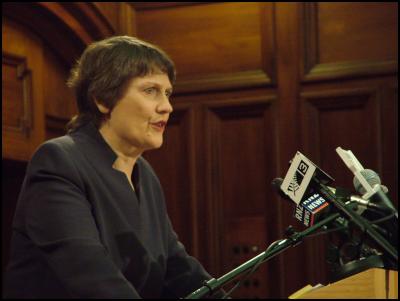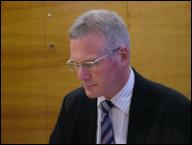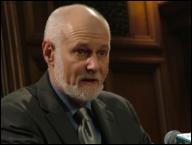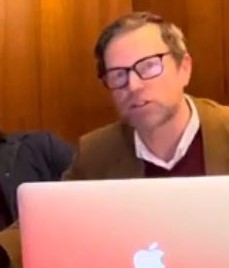Getting Labour’s Message
Out

Inside:
Working Group Set Up For Vietnam
Vets
London Bombings and NZ
Security
Govt Concentrates on
Elderly This Week
The Government emphasised this week work that had been achieved in looking after New Zealand’s elderly. With this in mind the Prime Minister attended a rather truncated post cabinet press conference and left ministers Steve Maharey and Pete Hodgson to explain to those incapable of reading press releases what the other themes of the last two weeks had been (health and education respectively). The reason for the Prime Minister’s hasty exit was so that she could attend a meeting of the Returned Soldiers Association (RSA).
Before the Prime Minister took any questions she outlined what was coming up in the next week. Major decisions relating to getting better value for money regarding tertiary education were made during today’s post-cabinet meeting. Trevor Mallard will release these next week. Later this week, Paul Swain will release data relating to his portfolio as Immigration Minister.
The Prime Minister was at pains to point out that a Sunday newspaper had got the wrong end of the stick regarding an alleged compensation commission for Vietnam veterans.
“This is not the case,” said the Prime Minister.
What was being set up was a working group was being set up consisting of officials from Mark Burton’s and George Hawkins’ offices, the RSA and the Vietnam Veterans’ Association. This group was tasked with looking at, and assessing, the recent Select Committee Inquiry’s findings relating to Vietnam veterans. Former State Services Commissioner Michael Wintringham will be acting as the chairperson for this working group.
The aim of setting up the group was so that the Vietnam veterans and the Government could move toward a “process of reconciliation.”
The Prime Minister considered the Vietnam veterans to be pleased that the current Labour-Progressive Government was the first administration to accept that the soldiers had indeed been subjected to a ‘toxic environment.’
The Prime Minister also explained that New Zealand soldiers executed for desertion during the Great War, and later pardoned, would be eligible for medals. The deceased soldiers’ next of kin would be able to receive these medals.
In the wake of last week’s attacks on London the Prime Minister stressed New Zealand does have a plan should similar eventualities occur here.
“We do have a national counter terrorism plan - it was developed by the Department of Prime Minister and Cabinet (DPMC) in consultation with other Government agencies. The plans, structure, and content was tested in ‘Exercise Lawman’ in March last year,” explained the Prime Minister
On Friday morning an interagency watch-group of officials collated all available information relating to the London bombings and met. After this meeting, at chief executive level, the officials of the domestic and external security committees met and considered the ramifications of the London attacks on New Zealand’s security.
The Prime Minister also pointed out that officials from New Zealand regularly attend security briefings in Australia given by Australian Intelligence agencies.
The Prime Minister left Mr Maharey and Mr Hodgson to ‘complete the briefing’.


This week the Government is concentrating on getting its messages out to elderly New Zealanders.
Mr Maharey reeled off a long list of topics that the Government wished to concentrate on including;
- low income New Zealanders and how they can get assistance with rates - the issue of ‘elder abuse’ - work being done through the Ministry of Social development relating to money for those who care for the elderly in their own homes.
The Government particularly wanted to emphasise health and how money from this year’s budget was to be spent in to assisting elderly New Zealanders.
Increases in funding for cataract surgery was yet to fully kick-in. However earlier Government funding increases in the area of orthopaedic surgery had seen an increase in operations by up to 30% in the last year.
Mr Hodgson was later asked questions on the Labour Party’s latest billboard campaign.
Mr Hodgson explained that the Labour Party’s aim in regard to its billboard campaign was to remind voters of what the Government had achieved in almost six years of government.
Sadly, some members of the media seemed incapable of remembering what the Government had done in the last three weeks, let alone the last six years. This fact gave further weight to Alistair Campbell’s (former media advisor to Tony Blair) theory that the media can be a barrier to information rather than a conduit - some (nameless) media representatives still seem unsure about what the Government’s ‘big themes’ have been over the last three weeks.
Mr Hodgson considered the recent emphasis on health had been beneficial in getting some important information out to the media and public - especially with regard to extra health staff.
“Could you tell me three weeks ago that there were 3600 extra nurses in New Zealand?” queried Mr Hodgson of the assembled masses.
Sadly no one could.



 Binoy Kampmark: Blinken Atrocious In A Dangerous World
Binoy Kampmark: Blinken Atrocious In A Dangerous World Jim Mikoz: Look Out Rocks … Oops Too Late
Jim Mikoz: Look Out Rocks … Oops Too Late Peter Dunne: Dunne’s Weekly - National And Labour Combine To Shut Out Greens
Peter Dunne: Dunne’s Weekly - National And Labour Combine To Shut Out Greens Ramzy Baroud: Voting Against Genocide - How Gaza Defeated The Democratic Establishment
Ramzy Baroud: Voting Against Genocide - How Gaza Defeated The Democratic Establishment  Alastair Thompson: Google's Support For Democracy And Media In NZ | Part 2
Alastair Thompson: Google's Support For Democracy And Media In NZ | Part 2 Eugene Doyle: BBC Goes Full Goebbels In Support Of Israeli Soccer Hooligans
Eugene Doyle: BBC Goes Full Goebbels In Support Of Israeli Soccer Hooligans